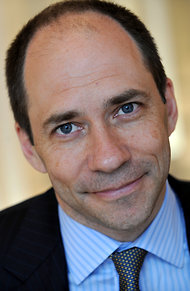 Essdras M Suarez/The Boston Globe Martin Baron, the new editor of The Washington Post.
Essdras M Suarez/The Boston Globe Martin Baron, the new editor of The Washington Post.
3:23 p.m. | Updated The Washington Post, facing steep financial challenges and striving to find profitability as readers abandon print newspapers for digital formats, changed its newsroom leadership on Tuesday.
The Post announced that Marcus Brauchli, its executive editor for the last four years, will step aside but remain with the company. Martin Baron, 58, editor of The Boston Globe, will replace Mr. Brauchli effective Jan. 2.
“We are thrilled to have Marty Baron lead The Washington Post’s newsroom,” said Katharine Weymouth, publisher of The Post. “He has a demonstrated record of producing the highest quality journalism, which matches the legacy and expectations of The Post.”
Mr. Brauchli joined the paper in 2008, leaving The Wall Street Journal several months after it was taken over by Rupert Murdoch’s News Corporation. Under Mr. Brauchli’s stewardship, The Post won four Pulitzer Prizes.
Mr. Brauchli will stay on as a vice president of The Washington Post Company, working closely with Donald E. Graham, the chairman and chief executive. He will evaluate new media opportunities, The Post’s statement said.
The change in leadership comes at a time when The Post, like many newspapers, has been struggling on many fronts. As Post readers have shifted their reading from print to online, the company has suffered from declining advertising revenue and steady circulation drops in recent years.
Revenue at its newspaper-publishing division dropped by 4 percent, to $137.3 million, in the third quarter, largely because of a decline in advertising. According to the Audit Bureau of Circulations, The Post’s circulation from Monday through Friday declined to 507,615 in March, compared with 698,116 in 2007. The company has already started laying off staff members in departments, including advertising and the technology team, to stem losses.
The paper also faces fresh competition from online news outlets, like Politico, whose founders include former Washington Post reporters. The Post Company’s news division also can no longer depend on Kaplan, its college and test preparation business, to help offset its losses.
But the company’s larger, industrywide problems have been made worse by internal tension between Mr. Brauchli and Ms. Weymouth, the granddaughter of Katharine Graham, the longtime publisher. Mr. Brauchli was quickly criticized by members of the newsroom, who described him as more distant than his predecessors, like Leonard Downie and Benjamin Bradlee.
 Katherine Frey/The Washington Post Marcus Brauchli, the departing editor of The Post, will remain with the company.
Katherine Frey/The Washington Post Marcus Brauchli, the departing editor of The Post, will remain with the company.
The relationship between Ms. Weymouth and Mr. Brauchli chilled as she pushed him to make newsroom cuts he was uncomfortable with, according to people in the newsroom familiar with the discussions.
Ms. Weymouth told journalists at public events this past summer that she wanted to remove Mr. Brauchli, people familiar with those discussions said. But Mr. Graham, her uncle and the company’s chairman, stepped in and advised her to try to work things out, these people said. Mr. Graham praised Mr. Brauchli in an interview last month.
Discussions between Ms. Weymouth and Mr. Brauchli broke down again in recent weeks when Mr. Brauchli brought to her a newsroom budget that incorporated the cuts she asked for; despite that, she rejected it, according to a person in the newsroom familiar with the discussions.
But Ms. Weymouth was more complimentary toward Mr. Brauchli in Tuesday’s announcement. She credited him with developing the paper’s Web operations and said he would be involved with finding “new media opportunities” for the company.
“Please join me in in thanking Marcus for all that he has done for The Post and in congratulating him on his new role with the company,” Ms. Weymouth said in a statement.
Mr. Brauchli, who received a long ovation in the newsroom after the 11:45 a.m. announcement, credited his staff with taking on “the hardest targets in journalism” and for becoming “pioneers in blogs and social media.” Ms. Weymouth declined to answer questions from the staff at the meeting about why the change was made.
Mr. Graham said that he looked forward to having Mr. Brauchli help him with the company’s digital developments. “It is raining start-ups and new-media projects and I’m in up to my neck, and Marcus and I are going to work on them together,” Mr. Graham said. He did not address the conflicts between his niece, the publisher, and Mr. Brauchli. “It is the publisher’s job to select the editor and I think Marcus Brauchli has been an excellent editor of The Washington Post and I think Marty Baron will be, too.”
Mr. Baron has overseen The Globe since 2001, and during this tenure the paper won six Pulitzer Prizes. Mr. Baron previously was executive editor of The Miami Herald and worked as a senior editor at The New York Times. Earlier in his career, he also worked for The Los Angeles Times.
Mr. Baron said in an interview that he looked forward to running a newspaper “that has had a defining and distinctive role in American journalism.” He said he was realistic about the challenges he would face in running a newspaper during tough financial times for the industry, and said it would be crucial to have a strong relationship with the newspaper’s publisher.
“There isn’t a news organization that isn’t facing significant financial pressures,” he said. “Every editor is having to make tough choices and I would expect to make tough choices. I’ve worked with many different publishers. I worked with three here at The Boston Globe. It’s an important relationship. It’s not always an easy relationship. At times, there can be moments of tension. But we certainly have to share our goals and be compatible and everyone needs to work at that.”
Christopher M. Mayer, the publisher of The Globe, which is owned by The New York Times Company, was informed of the news while he was in London celebrating his 25th wedding anniversary. He said he received the news “with mixed emotions,” describing Mr. Baron as “a staunch advocate of the kind of accountability journalism that digs deep and serves the public, and a fierce advocate of the First Amendment.” He cited Mr. Baron’s leadership of the paper’s investigation into the sex abuse scandal in the Roman Catholic Church.
While the news of Mr. Brauchli’s imminent departure has generated much chatter within the newspaper industry, it has apparently meant little to the readers who still faithfully turn to The Post for information and analysis.
Sean Gibbons, vice president for communications of the centrist research organization Third Way and a former CNN producer, said that while he received most of his election night coverage via Twitter, he made sure to read The Washington Post the day after for the insights of some of its reporters and columnists.
“The Post still holds the advantage of being the sort of grande dame of Washington,” Mr. Gibbons said. “It’s been there. It’s still an institution.”
Article source: http://mediadecoder.blogs.nytimes.com/2012/11/13/new-top-editor-at-washington-post-brauchli-to-be-replaced-by-marty-baron/?partner=rss&emc=rss
Speak Your Mind
You must be logged in to post a comment.